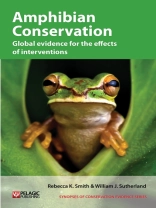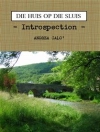Amphibian Conservation is the fourth in the series of Synopses of Conservation Evidence, linked to the online resource www.Conservation Evidence.com.
This synopsis is part of the Conservation Evidence project and provides a useful resource for conservationists. It forms part of a series designed to promote a more evidence-based approach to biodiversity conservation. Others in the series include bee, bird, farmland and bat conservation and many others are in preparation.
Approximately 32% of the 7, 164+ amphibian species are currently threatened with extinction and at least 43% of species are declining. Despite this, until recently amphibians and their conservation had received little attention. Although work is now being carried out to conserve many species, often it is not adequately documented.
This book brings together and summarises the available scientific evidence and experience relevant to the practical conservation of amphibians.
The authors consulted an international group of amphibian experts and conservationists to produce a thorough summary of what is known, or not known, about the effectiveness of amphibian conservation actions across the world.
‘The book is packed with literature summaries and citations; a veritable information goldmine for graduate students and researchers. It also admirably provides decision makers with a well-researched resource of proven interventions that can be employed to stem/reverse the decline of amphibian populations.’ -John G Palis, Bulletin of the Chicago Herpetological Society
表中的内容
1 Threat: Residential and commercial development
2 Threat: Agriculture
3 Threat: Energy production and mining
4 Threat: Transportation and service corridors
5 Threat: Biological resource use
6 Threat: Human intrusions and disturbance
7 Threat: Natural system modifications
8 Threat: Invasive alien and other problematic species
9 Threat: Pollution
10 Threat: Climate change and severe weather
11 Habitat protection
12 Habitat restoration and creation
13 Species management
14 Education and awareness raising
Index
关于作者
Bill Sutherland is Miriam Rothschild Professor of Conservation Biology at the University of Cambridge and President of the British Ecological Society. He is known for his research on integrating science and policy particularly in the field of evidence-based conservation. Two of his key contributions have been the horizon-scanning exercises to identify future priority issues and the 100 important questions in various disciplines (ecology, poverty prevention, global agriculture and food amongst others). He has also worked extensively on bird population ecology and the biodiversity impacts of agriculture.












